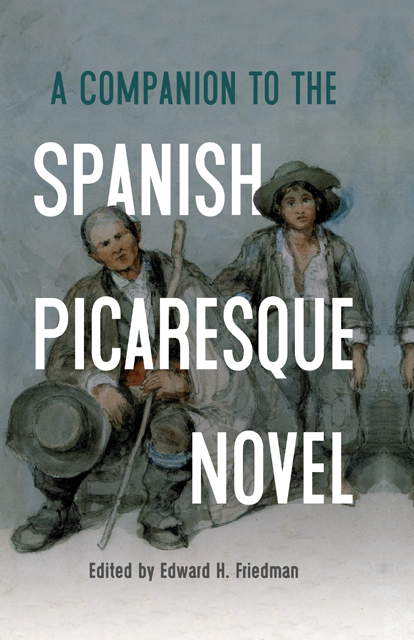Book contents
- Frontmatter
- Contents
- List of Illustrations
- List of Contributors
- Foreword
- 1 The Picaresque as a Genre
- 2 On the Picaresque and Its Origins
- 3 Francisco Delicado, La lozana andaluza
- 4 Lazarillo de Tormes
- 5 Mateo Alemán, Guzmán de Alfarache
- 6 Francisco de Quevedo, La vida del Buscón
- 7 La pícara Justina
- 8 Alonso Jerónimo de Salas Barbadillo, La hija de Celestina
- 9 Miguel de Cervantes and the Picaresque
- 10 Vicente Espinel, Marcos de Obregón
- 11 Carlos García, La desordenada codicia de los bienes agenos
- 12 Estebanillo González
- 13 Critical Approaches to the Picaresque
- 14 The Picaresque in Spanish America
- 15 Continuations: France and England
- 16 The Continuity of the Picaresque: Spain
- Bibliography
- Index
- Tamesis • Companions
7 - La pícara Justina
Published online by Cambridge University Press: 11 January 2023
- Frontmatter
- Contents
- List of Illustrations
- List of Contributors
- Foreword
- 1 The Picaresque as a Genre
- 2 On the Picaresque and Its Origins
- 3 Francisco Delicado, La lozana andaluza
- 4 Lazarillo de Tormes
- 5 Mateo Alemán, Guzmán de Alfarache
- 6 Francisco de Quevedo, La vida del Buscón
- 7 La pícara Justina
- 8 Alonso Jerónimo de Salas Barbadillo, La hija de Celestina
- 9 Miguel de Cervantes and the Picaresque
- 10 Vicente Espinel, Marcos de Obregón
- 11 Carlos García, La desordenada codicia de los bienes agenos
- 12 Estebanillo González
- 13 Critical Approaches to the Picaresque
- 14 The Picaresque in Spanish America
- 15 Continuations: France and England
- 16 The Continuity of the Picaresque: Spain
- Bibliography
- Index
- Tamesis • Companions
Summary
This chapter examines the positioning of La pícara Justina, attributed, but not conclusively, to Francisco López de Úbeda, against previous picaresque novels, and the significance of a female antiheroine/protagonist with a distinct role in the development of the genre. The chapter explores the particular layout of the novel, central to the storytelling technique of its author, which appears to govern the readership’s outlook on the protagonist while simultaneously permitting Justina to act and speak freely. Likewise, the chapter investigates the novel measured against guided readings or treatises regarding women’s space. These types of writings underscore an overall societal obsession with maintaining pure – Christian – bloodlines and adhering to the traditional structures of a society built around an overzealous and illusory code of honor, which Justina reflects in her narrative. Notwithstanding this picaresque tale’s positioning within the genre or characteristics garnered from other forms of literature, a useful approach to understanding the novel may be to examine its first-person narrator/protagonist as a figure of rebellion against literary and societal norms, as an antiheroine.
Antiheroes, in the words of Rebecca Stewart, can begin to be defined “in terms of negation, of what they are not – honest, idealistic, courageous, honourable, noble” (“Editor’s” 7). If the Western storytelling tradition takes its heroic cue under the aegis of its first heroes – Achilles, Perseus, Odysseus, Hercules, et al. – who are characters that embody bravery, skill, strength, honor, and wit for the common good, then the antihero must negate these attributes. Accordingly, the antihero refuses “to bow to the expectations of society and rebel[s] against the rules that bind us all” (Rebecca Stewart, “Editor’s” 7). Francisco López de Úbeda’s 1605 Libro de entretenimiento de la pícara Justina (Book of Entertainment of the Picara Justina) outlines just such an antihero, but with the additional accouterments of her gender and the hyperbolic description of her persona and conduct. Not only does Justina negate heroic ideals, but, moreover, she overturns the archetype of the male picaresque antihero by dint of hyperbole, thereby rendering the novel a burlesque of the newly minted picaresque genre as a whole. The reading of this novel as a parody of the picaresque genre, religion, and society is one of the typical interpretations engaged in by literary and cultural scholars, most notably originating with Marcel Bataillon’s Pícaros y picaresca (Picaros and the Picaresque).
- Type
- Chapter
- Information
- A Companion to the Spanish Picaresque Novel , pp. 79 - 92Publisher: Boydell & BrewerPrint publication year: 2022



